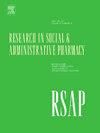对培养医学生应变能力的计划进行现实主义审查:哪些计划有效,对谁有效,为什么有效?
IF 3.7
3区 医学
Q1 PUBLIC, ENVIRONMENTAL & OCCUPATIONAL HEALTH
Research in Social & Administrative Pharmacy
Pub Date : 2024-10-11
DOI:10.1016/j.sapharm.2024.10.006
引用次数: 0
摘要
背景:在医疗保健专业的本科生和研究生教育课程及学位项目中,实施了各种旨在培养学生抗挫折能力的计划。这些计划中哪些能在何种情况下提高参与者的抗挫折能力,对谁有影响,为什么会有影响,这些都还不确定:方法:通过使用经过验证的心理测量调查,对报告课程成果的文章进行了现实主义审查,以调查哪些情境有利于培养医疗保健和健康科学专业学生的抗挫折能力,以及必须启动哪些机制才能实现这一成果:结果:从 43 篇文章的数据中归纳出 13 种情境-机制-结果配置。结果:我们从 43 篇文章的数据中归纳出了 13 种情境-机制-结果配置,并将这些配置与解释支持计划的理论和心理框架的理论相结合,从而形成了关于抗逆力培养计划如何以及为何有效的计划理论。有利于抗逆力发展的环境是使用经过验证的心理框架作为计划的基础,例如认知行为疗法、正念训练。专家协助、课程的纵向整合、灵活和多模式的设计与实施,以及学生应用和实践抗逆力培养策略的机会,也创造了有利的环境。满足学生或从业人员的需求激活了信任机制、参与机制以及对课程价值和实际效益的认可。通过培养学生的反思能力、元认知意识和积极的思维习惯,提高了学生的抗挫折能力:通过现实主义审查建立的项目理论为如何在整个本科、研究生学位和早期实践过程中培养医护学生的个人抗压能力提供了指导,从而有可能支持他们在所选的专业岗位上茁壮成长并保持长期发展。本文章由计算机程序翻译,如有差异,请以英文原文为准。
A realist review of programs fostering the resilience of healthcare students: What works, for whom and why?
Background
Various programs aimed at fostering the resilience of students have been implemented into healthcare undergraduate and postgraduate educational courses and degree programs. Which of these increase their participants’ resilience under which circumstances, for whom and why remains uncertain.
Methods
A realist review of articles reporting program outcomes as measures of resilience through the use of via validated psychometric surveys was conducted to investigate which contexts favour the development of resilience of healthcare and health sciences students and which mechanisms have to be activated to achieve this outcome.
Results
Thirteen Context-Mechanism-Outcome Configurations were synthesised from data presented in 43 articles. These were combined with theories explaining the theoretical and psychological frameworks underpinning programs to develop a program theory of how and why resilience fostering programs work. Contexts which favour the development of resilience were the use of validated psychological frameworks as program foundation, e.g. Cognitive Behavioural Therapy, mindfulness-based training. Expert facilitation, longitudinal integration into curricula, flexible and multi-modal design and delivery, and opportunities for students to apply and practice resilience-building strategies also created favourable contexts. Meeting students' or practitioners' needs activated mechanisms of trust, engagement and recognition of a program's value and real-world benefits. An increase in resilience was achieved by students developing reflective skills, metacognitive awareness and positive habits of mind.
Conclusion
The program theory established via a realist review provides guidance on how the individual resilience of healthcare students can be fostered throughout their undergraduate, postgraduate degrees and early practice, potentially supporting them to flourish and remain long-term in their chosen professional roles.
求助全文
通过发布文献求助,成功后即可免费获取论文全文。
去求助
来源期刊

Research in Social & Administrative Pharmacy
PUBLIC, ENVIRONMENTAL & OCCUPATIONAL HEALTH-
CiteScore
7.20
自引率
10.30%
发文量
225
审稿时长
47 days
期刊介绍:
Research in Social and Administrative Pharmacy (RSAP) is a quarterly publication featuring original scientific reports and comprehensive review articles in the social and administrative pharmaceutical sciences. Topics of interest include outcomes evaluation of products, programs, or services; pharmacoepidemiology; medication adherence; direct-to-consumer advertising of prescription medications; disease state management; health systems reform; drug marketing; medication distribution systems such as e-prescribing; web-based pharmaceutical/medical services; drug commerce and re-importation; and health professions workforce issues.
 求助内容:
求助内容: 应助结果提醒方式:
应助结果提醒方式:


